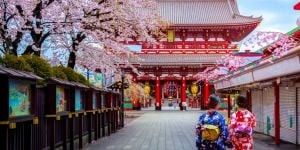
Tokyo is definitely the ideal place to find a job in Japan. This is where the headquarters of large corporations are located. This is also where one can have a thriving career and have access to senior positions. There are more job offers available than in other cities. Most of the expatriates settle in Tokyo. In addition to employment opportunities, the capital also provides a valuable living environment: accessible transportation, entertainment complexes, national parks, etc.
Tokyo's economy
Tokyo, the world's financial capital, is also Japan's economic, financial, and commercial center. With a vast population leading to a massive economy, Tokyo has the most significant labor force and demand for goods and services in Japan. The city's main financial contributors are services, finance, insurance, and high technology. In other words, there are plenty of professional opportunities in the Japanese capital, yet, of course, it is also super competitive.
Tokyo's GDP in FY2020 reached approximately 109.6 trillion yen, making up more than 20% of the country's GDP. This number is similar to the GDP of an entire nation, such as Indonesia or the Netherlands.
Tokyo is home to many foreign companies and local companies seeking foreign influence. Most of the major Japanese companies, including Hitachi, Rakuten, NTT Docomo, KDDI, etc., have their headquarters in Tokyo.
Jobs in Tokyo for foreigners
Tokyo offers various job opportunities for foreigners, with popular positions including English teachers, service staff, IT professionals, translators or interpreters, engineers, sales and marketing managers, and head hunters. Whether you prefer working in international cooperates or Japanese companies, many options and possibilities are available on the diverse job market in Tokyo. Consider your skills and interests to find a position that suits you best.
When we associate “expatriate” and “employment in Japan”, we often think of “language teacher”. There are indeed recruitments in the sector (especially for English teacher positions), but there are also many other job offers in Tokyo.
The city has many companies that specialize in international trade. Some positions are aimed at foreign nationals who have good work experience, such as mastery of Japanese, diplomas, networks, etc. Since competition is fierce among foreigners wishing to work in Tokyo, you need to stand out!
You can also look at international companies based in Tokyo, such as translation companies and media specialists. Contact them directly to submit your application.
If you plan to teach English, there are plenty of opportunities in Tokyo. As Japan's most populous city, Tokyo has many schools, universities, and language institutions that are often looking for foreign teachers. Teaching French, Mandarin, Spanish, and German are also interesting fields to consider.
Finding a job in Tokyo
The labor market in Japan is twofold, with a so-called “regular” market (long-term jobs) and an “irregular” market (baito, part-time jobs).
Before applying for a job in Tokyo, it is important to understand the competitive nature of the job market. Familiarize yourself with the eligibility requirements for the position you are interested in. Many employers in Japan prefer candidates with a university degree or at least 10 years of experience in their respective fields. Moreover, being proficient in Japanese is usually a prerequisite for employment unless you are planning to work for a multinational company.
Finding a baito
It is relatively easy to find a baito. In Tokyo, many shops display “boshuu” (recruitment) or “daiboshuu” (large recruitment), because baito is a precarious job, staff turnover is more important.
As an expatriate, the better your level of Japanese, the more you will have access to baito. However, you don't have to be bilingual to get a baito.
It all depends on the type of job. Some offers specify that it is not necessary to speak Japanese. Others require a beginner level, or conversational. By “conversational”, we often mean: understanding a simple, basic conversation, to be able to express oneself simply and interact (everyday conversation). In practice: for a job as a konbini or mini-mart employee, as a waiter, you may be asked for a conversational level.
You may not have the opportunity to speak much, but you will need to have a basic knowledge of Japanese to understand the instructions (if they are given in Japanese), read the kanji, understand any questions from customers etc.
As mentioned above, you will also find baito offers, even without speaking Japanese. For example, some high schools in Tokyo regularly recruit staff in baito, without requiring them to speak Japanese; same goes for maintenance jobs (cleaning, service in a guesthouse, etc.)
The main sectors that recruit in baito are catering and the services sector:
- Catering: waiter, kitchen helper, diver, etc.;
- Services: konbini employees (convenience store open 24 hours a day), employees of mini-markets, shopping malls, guesthouses, hotels, gas stations, babysitters, maintenance staff, private teachers, language school staff, school staff, etc.
Applying for a job in Tokyo
- By phone
If you are fluent in Japanese, call the recruiter directly. When you see the sign outside the company that says “boshuu” (recruitment), there is always a phone number. Quite often, everything is written in Japanese.
- Specialized press
You will find many free magazines, in stations or konbini, which list job offers (baito and permanent jobs) by geographical sector and line of business. Once again, most of it is written in Japanese. Examples of reviews: JobAidem, Townwork, etc.
- By email
If you are not fluent in Japanese, opt for email and announcements in English. There are some ads in French, but they are so few that it is better to use English.
Examples of websites offering job offers in English: Jobs in Japan, Gaijin Pot, Craiglist, Nihon Arubaito, etc.
Finding a so-called “regular” job
Speaking Japanese is a prerequisite when looking for a baito.
Of course, you will find offers for which speaking English will suffice (some international companies, for example). However, pay attention to learning the language, especially if you're planning to make an extended stay. Competition is fierce, especially in Tokyo, which means more job offers and, consequently, more candidates.
Recruiters, especially if they are Japanese, expect you to be fluent in both Japanese and English. They may ask you for written evidence: the Japanese Proficiency Language Test (JLPT) results and the Test of English for International Communication (TOEIC). Concerning Japanese, they often ask for JLPT 2 (bilingual level). If you have the level above (N1, expert), it is an additional asset to be promoted.
Still, regarding languages, if you speak another language, let it be known. Since your competitors will also speak Japanese and English, your goal is to stand out from the crowd.
Job offers are also available in specialized magazines (the same ones that offer baito). To apply, as with baito, call the recruiter directly. You can also send a post mail or an email.
The Japanese CV
In Western countries, the rules concerning the presentation of a CV are relatively flexible. Clarity is preferred so that reading is quick and informative. In short, the recruiter must be able to scan your CV quickly. There is no specific color-coded layout. It is a considerable asset to stand out from other candidates.
In Japan, writing a CV is quite different. All CVs have a predefined form, a template (form) that must be respected. There are two types of CVs:
- Rirekisho: This is the basic CV used by the majority of applicants. Whether you are looking for a small job or a first job, this is the model you will use;
- Shokumu Keirekisho: This is another CV in which you are asked for more details about your curriculum vitae. It shows more interest in your experience. It is reserved for so-called “regular” full-time positions.
There is also the summary, equivalent to the Western CV, but it is rarely used.
Please note that for a baito, for example (and especially if the ad is in English), the recruiter will be okay with sending a Western-type CV by email.
The Konbini (mini-markets open 24 hours a day) sell rirekisho, which usually contains several forms and envelopes. You will also find CV templates on the Internet.
In practice
Japanese CVs are usually on two pages, even for a first job:
- Left page: your contact details and your professional background;
- Right page: your hobbies and your cover letter.
Use black ink to write your CV. It will be a requirement to date and sign it and always rewrite your CV.
Innovation encourages some people to opt for the typewritten form. A CV can be clearly understood if sent by email, but if you want to play it safe, try to remain classic (handwritten CV) if you apply by mail.
Never fold your CV in the case you are sending it by post.
The information enclosed in your CV (rirekisho)
- Your passport photo: face clear: people with long hair should tie it up, wear a dark suit, tie for men. Smile discreetly. Plain white background. Smile. Focus on the objective: your future employer must feel your ease and determination;
- Contact details: your name in Latin alphabet (romaji) and katana;
- Date of birth: In Japan, we count in “imperial years”. Be sure to check the period of your date of birth. However, many recent forms opt for transition into calendar years, which makes the task much easier;
- Your career path;
- Education: from the oldest to the most recent period;
- Professional experience: Same as the educational one. Avoid periods of inactivity. This can make the task difficult; however, in Japan, as in Western countries, CVs with periods of inactivity are frowned upon. Another point: recruiters also seem to fear the multiplication of experiences, which would be a sign of an inability to keep a sustainable job.
Important:
Don't forget to write “ijou” (end) under your last work experience (right), to let the recruiter know that you have finished listing your work experience.
Certifications, licences: JLPT, TOEIC, driving licence, etc., include all the other “diplomas”, certifications, that you have received.
Other details
- Personal situation: You will be asked about your family situation (dependent, spouse), the nearest station to your house, your commuting time to work and home, etc.;
- Skills and interests: You have a box to talk about your other skills. Here, we are getting closer to the Western model. Skills: mastery of a particular software, for example. Feel free also to fill in all the languages spoken, including those for which you still need to take an exam. Finally, talk about your hobbies,
- Motivation: Another box which gives you the opportunity to write your cover letter. Be brief, precise, and concise. You don't have much space to write (especially if you have large handwriting!);
- Other requests, special requests: In this box, you are asked if you have any claims, in terms of remuneration, for example, working schedule, place of work: for example, if you do not want to work on weekends, you can write it here. If you have no wishes, leave the box blank;
- References: it is up to their legal guardian to complete it, by providing their contact details.
In practice, for the baito or the first jobs, a rirekisho is enough. For more highly qualified positions, or, if your company requests it, you will have to write a shokumu keirekisho: give details about your background.
Set your objectives, either regular, qualified, or baito job. This will allow you to complete your expatriation project. Do you plan to stay for a specific period (one, two years?), or are you planning a long-term future in Japan?
If you lean towards the second proposal, enhance your profile. The more assets you have – such as fluency in Japanese, English, or even other languages, diplomas, and experience – the more likely you are to be of interest to recruiters.
The interviews for jobs in Tokyo
In Japan, job interviews can be pretty formal, especially if you're not used to dress codes in your industry. However, it's always better to dress nicely and appropriately depending on the company and position.
Wearing a suit may not be necessary for tech and design-related companies. It's not a problem if you do, but you might feel a bit out of place. However, things may be different for customer-facing positions like sales. It's a good idea to research the specific company you're applying to, but often, a business suit is a safer choice, even for international companies.
Interviews often include several commonly asked questions, such as:
- Why did you apply for this company?
- What information do you have about the company?
- Can you share your relevant experience for this position?
- What were the reasons behind leaving your previous job?
- Do you have any inquiries for our company?
A well-crafted CV and compelling cover letter, together with your performance during an interview, can determine whether you land your desired job or not. With thorough preparation, you'll be ready to conquer the job-seeking journey in Tokyo.
Useful links:
Japanese websites
We do our best to provide accurate and up to date information. However, if you have noticed any inaccuracies in this article, please let us know in the comments section below.








